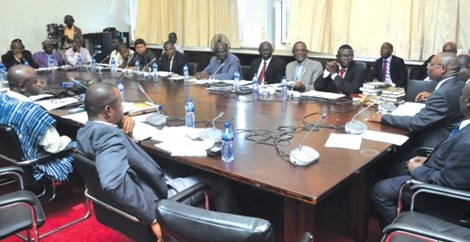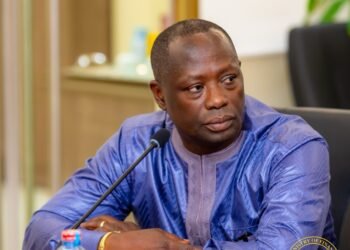A recent revelation about a major discrepancy in Ghana’s public debt records has sparked serious concerns over transparency and accountability in public financial management.
According to the 2024 Audit Report on the Public Accounts of Ghana, the country’s total national debt, as reflected in the whole of Government Accounts, was overstated by a staggering GH₲138.91 billion.
This discrepancy, highlighted in the audit findings for the year ending 31st December 2024, has drawn the attention of key oversight institutions and the general public.
The Chairperson of the Public Accounts Committee (PAC), Hon. Abena Osei-Asare, who is also the Member of Parliament for Atiwa East, emphasized that such a monumental error is not to be taken lightly.
She referenced the audit document’s paragraphs 13 to 18, which clearly indicate a mismatch between figures reported by the Controller and Accountant-General’s Department (CAGD) and those from the Ministry of Finance.
“While the Controller and Accountant-General’s Department (CAGD) reported Ghana’s total public debt as GH¢876.01 billion, the Ministry of Finance — which has the official mandate to account for all public borrowing — recorded a much lower figure of GH¢737.17 billion.
“This discrepancy includes: GH¢132.98 billion overstatement in domestic debt; GH¢1.77 billion overstatement in external debt; COCOBOD’s domestic debt overstated by GH¢4.15 billion, while its external debt was understated by GH¢2.1 million.”
Hon. Abena Osei-Asare
According to the MP, these figures point to more than mere clerical oversights.

She stressed that they reflect deep-rooted structural flaws and coordination failures within Ghana’s broader public accounting and financial reporting systems.
These inconsistencies raise critical questions about the effectiveness of internal controls, the quality of data reconciliation, and the level of inter-agency collaboration in handling national accounts.
According to the audit, the responsibility for preparing consolidated government accounts lies solely with the CAGD, placing the spotlight squarely on that institution to ensure the highest levels of accuracy.
PAC Promises Scrutiny Into Mismatched Public Debt
In response to the revelations, Hon. Abena Osei-Asare assured the public that the Public Accounts Committee (PAC) will address the issue with utmost seriousness.
As the body constitutionally mandated to uphold financial accountability, the PAC plans to conduct a thorough investigation into the origins of the misstatement.
The Committee will also engage the Ministry of Finance, the CAGD, and other relevant stakeholders to identify any lapses that may have contributed to the disparity.
Furthermore, she noted that the PAC will “ensure that the Audit Service’s recommendations are not only acknowledged but implemented.”

Among these recommendations is the need for improved collaboration between financial oversight agencies to ensure reliable and consistent national reporting in future audits.
The audit’s paragraph 17 calls for enhanced communication and cooperation to safeguard against such large-scale errors.
Accordingly, Hon. Osei-Asare noted that the misreporting, given its scale, threatens the integrity of Ghana’s entire public financial management system.
She stressed the importance of accuracy in national accounting, asserting that public officials must uphold the highest standards of precision, particularly in matters that concern the nation’s fiscal health.
Restoring Confidence in Public Institutions
Hon. Osei-Asare also underlined that rebuilding public trust is imperative. To that end, the Public Accounts Committee intends to monitor the implementation of the audit’s recommendations and ensure compliance with statutory obligations.
The overarching goal, the PAC’s chair maintained, is to promote transparency, uphold public interest, and maintain fiscal discipline.
“This is about protecting the integrity of our public financial systems and rebuilding public confidence in the institutions that manage our resources. As public servants, we must demand precision—not approximation — especially when it comes to the national accounts.”
Hon. Abena Osei-Asare

This development has reignited the public discourse around accountability and institutional reform. Civil society groups and economic observers have joined the chorus calling for stricter regulatory oversight and greater investment in data management systems.
With Ghana facing mounting economic challenges, accurate reporting on public debt is essential for sound policy planning, investment decisions, and international credibility.
Misstatements of this scale can hinder negotiations with development partners, disrupt budget allocations, and erode confidence in financial governance.
The Audit Service’s report serves as a timely reminder of the need for effective oversight and transparency. It also highlights the crucial role of parliamentary committees such as the PAC in safeguarding national resources and holding public officials accountable.
In the weeks ahead, all eyes will be on the PAC and its efforts to unravel the root causes of this discrepancy and propose concrete steps for reform. “The PAC remains fully committed to its constitutional mandate of ensuring accountability, transparency, and value for money in the use of public funds.”
READ ALSO: GSE Wobbles as Trading Volume Plunges 95%



















